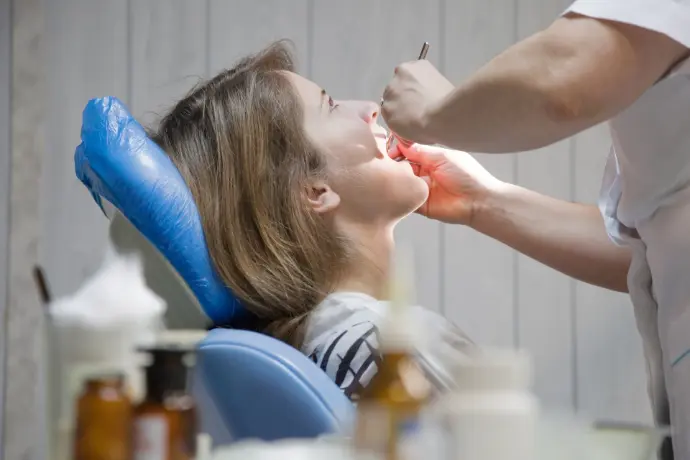Diabetes mellitus and oral health share a complex, two-way relationship that many patients and healthcare providers overlook. At Vident Dental Clinic, we regularly observe how blood glucose management affects dental outcomes, and conversely, how periodontal health influences glycemic control. Understanding this interconnection is crucial for anyone managing diabetes.
This comprehensive guide explores the unique oral health challenges faced by diabetic patients and provides evidence-based strategies for maintaining optimal dental health while living with this condition.
The Bidirectional Relationship: Diabetes and Oral Health
The connection between diabetes and oral health functions as a two-way street, with each condition significantly influencing the other in ways that can create either beneficial cycles of improvement or problematic cycles of deterioration.
How Diabetes Affects Your Mouth
Diabetes creates several physiological changes that directly impact oral tissues:
- Microvascular changes: Reduced blood flow to gingival tissues impairs healing and nutrient delivery
- Collagen metabolism alterations: Affected collagen synthesis and degradation weakens periodontal structures
- Immune function modification: Compromised neutrophil function reduces the body's ability to combat oral bacteria
- Advanced glycation end-products: These compounds trigger inflammatory responses in periodontal tissues
- Salivary dysfunction: Reduced flow and altered composition diminish the mouth's natural protective mechanisms
These changes manifest in several common oral conditions among diabetic patients:
Periodontal Disease: The Sixth Complication of Diabetes
Often called the "sixth complication of diabetes," periodontal disease affects nearly 22% of diagnosed diabetics. Research published in the Journal of Periodontology demonstrates that:
- Poorly controlled diabetics are three times more likely to develop severe periodontitis than non-diabetics
- The relationship follows a dose-response pattern—worse glycemic control correlates with more severe periodontal destruction
- Even those with pre-diabetes show increased susceptibility to gingival inflammation
- Progression occurs more rapidly and responds less predictably to standard treatments
- Bone loss patterns tend to be more generalized rather than localized to specific areas
Beyond Gum Disease: Other Oral Manifestations
Diabetes affects the entire oral cavity, not just periodontal tissues:
- Xerostomia (dry mouth): Affects up to 76% of diabetic patients, increasing caries risk and causing discomfort
- Candidiasis: Higher glucose levels in saliva create favorable environments for fungal overgrowth
- Delayed healing: Surgical sites and everyday micro-injuries require longer recovery periods
- Burning mouth syndrome: Neuropathic changes can create persistent oral discomfort
- Taste alterations: Diminished taste perception, particularly sweetness, affecting quality of life
These conditions collectively create significant challenges for maintaining oral health while managing diabetes.
How Oral Health Affects Diabetes
The influence flows in the opposite direction as well, with periodontal health status directly impacting glycemic control:
- Systemic inflammation: Active periodontal disease increases inflammatory mediators throughout the body
- Insulin resistance: Chronic inflammation from periodontal disease can worsen insulin resistance
- Bacterial burden: Periodontal pathogens and their byproducts enter the bloodstream, affecting metabolism
- Glycemic control challenges: Untreated periodontal disease makes diabetes more difficult to manage
- Medication efficacy reduction: Inflammatory states can diminish the effectiveness of diabetes medications
The Evidence for Improvement
Multiple clinical studies demonstrate that addressing periodontal health improves diabetic outcomes:
- A landmark study in the Journal of Clinical Periodontology found that effective periodontal therapy reduced HbA1c levels by approximately 0.4% after three months
- This improvement is comparable to adding a second medication to a diabetes management regimen
- The greatest benefits occur in those with higher baseline HbA1c levels and more severe periodontal disease
- Improvements persist when periodontal health is maintained through ongoing supportive care
- Combined periodontal therapy and diabetes management yield better results than addressing either condition alone
These findings highlight why coordinated care between dental and medical providers is essential for diabetic patients.
Essential Oral Care Strategies for Diabetic Patients
Managing oral health with diabetes requires a proactive, comprehensive approach tailored to the unique challenges presented by this condition.
Glycemic Control: The Foundation of Oral Health
Research consistently demonstrates that good glycemic control forms the cornerstone of oral health for diabetic patients:
- Maintaining HbA1c levels below 7% significantly reduces periodontal disease risk
- Stable blood glucose improves treatment outcomes for existing oral conditions
- Well-controlled diabetes allows for normal healing following dental procedures
- Consistent glucose management reduces complications like xerostomia and opportunistic infections
- Medication adherence benefits both systemic and oral health simultaneously
Working with your medical team to optimize diabetes management represents your most powerful tool for maintaining oral health.
Enhanced Home Care Protocols
Diabetic patients benefit from a more intensive approach to daily oral hygiene:
- Brushing technique modification: Consider electric toothbrushes with pressure sensors to prevent tissue damage
- Interdental cleaning emphasis: Daily cleaning between teeth becomes even more crucial
- Tongue cleaning integration: Reduces bacterial load and helps manage oral malodor
- Timing optimization: Coordinate oral care with meals and medication schedules
- Product selection guidance: Choose products formulated for dry mouth and gingival health
A systematic review in Diabetes Care found that diabetic patients who implemented enhanced home care protocols experienced 62% less gingival inflammation compared to those following standard recommendations.
Professional Care Frequency Adjustment
Standard six-month recall intervals may prove insufficient for diabetic patients:
- Consider three to four-month hygiene intervals based on individual risk assessment
- Coordinate dental visits with medical appointments when possible
- Schedule comprehensive periodontal evaluations at least annually
- Arrange more frequent screenings for oral candidiasis and other complications
- Implement early intervention protocols at the first sign of gingival changes
This proactive approach allows for timely management of emerging issues before they progress to more serious conditions.
Nutritional Considerations for Dual Management
Dietary choices affect both diabetes and oral health simultaneously:
- Anti-inflammatory foods: Omega-3 rich options like fatty fish support both periodontal and systemic health
- Calcium and vitamin D: Essential for maintaining alveolar bone integrity
- Antioxidant-rich choices: Colorful fruits and vegetables combat oxidative stress
- Protein adequacy: Supports tissue repair and immune function
- Hydration emphasis: Particularly important for managing xerostomia
Working with a registered dietitian who understands both diabetes management and oral health can help develop an integrated nutritional approach.
Xerostomia Management Strategies
Addressing dry mouth requires a multifaceted approach:
- Saliva substitutes: Select pH-balanced products without fermentable carbohydrates
- Hydration scheduling: Regular sipping of water throughout the day
- Stimulation techniques: Sugar-free gum containing xylitol to stimulate natural flow
- Humidification: Especially important during sleep when salivary flow naturally decreases
- Medication review: Work with your physician to adjust medications when possible
Effective management of xerostomia not only improves comfort but significantly reduces caries risk and fungal infection susceptibility.
Special Considerations for Dental Treatment
Diabetic patients require certain modifications to standard dental protocols to ensure safety and optimal outcomes.
Appointment Scheduling Strategies
Thoughtful scheduling can prevent complications:
- Morning appointments: Blood glucose levels are typically more stable earlier in the day
- Adequate appointment length: Allow extra time to accommodate potential management needs
- Meal and medication timing: Schedule around usual eating and medication patterns
- Stress reduction protocols: Implement strategies to minimize anxiety-induced glucose fluctuations
- Emergency availability: Establish clear protocols for urgent dental needs
These considerations help maintain glycemic stability throughout dental treatment.
Surgical and Invasive Procedure Protocols
Diabetic patients undergoing oral surgery or invasive procedures benefit from:
- Pre-procedure glycemic assessment: Verify stable glucose levels before beginning
- Prophylactic antimicrobial consideration: Based on individual risk factors
- Extended post-operative monitoring: Watch for delayed healing or infection signs
- Detailed homecare instructions: Specific guidance for surgical site management
- Scheduled follow-up: Earlier and more frequent than standard protocols
A study in the Journal of the American Dental Association found that diabetic patients with pre-surgical HbA1c below 7% experienced complication rates similar to non-diabetic individuals, highlighting the importance of glycemic control before procedures.
Prosthetic and Restorative Considerations
Diabetes influences decisions about dental materials and techniques:
- Implant planning modifications: More conservative approaches with longer healing periods
- Material selection guidance: Consider infection resistance and tissue compatibility
- Removable prosthesis design: Minimize tissue trauma and facilitate hygiene
- Margin placement strategies: Supragingival when possible to reduce inflammation risk
- Occlusal scheme planning: Distribute forces optimally to protect compromised periodontium
These adaptations help ensure long-term success of dental restorations in diabetic patients.
The Collaborative Care Model: Dentistry and Medicine United
Optimal management of diabetes and oral health requires coordination between healthcare providers.
Communication Frameworks
Effectieve informatie-uitwisseling verbEffective information sharing improves outcomes:etert resultaten:
- Standardized medical consultation forms: Facilitate consistent information exchange
- Electronic health record integration: When possible, share relevant health data
- Laboratory result sharing: HbA1c values and other relevant markers
- Medication reconciliation processes: Ensure all providers have current information
- Coordinated care planning: Align treatment timing with overall health status
This communication helps prevent complications and enables truly comprehensive care.
Cross-Disciplinary Education
Both dental and medical professionals benefit from understanding the diabetes-oral health connection:
- Medical team education: Ensuring physicians recognize oral health as integral to diabetes management
- Dental team training: Keeping current on diabetes management approaches and medications
- Patient education coordination: Consistent messaging across healthcare settings
- Shared decision-making: Involving all stakeholders in treatment planning
- Outcome tracking: Monitoring both glycemic control and periodontal status
When all providers understand the bidirectional relationship, care becomes more effective and efficient.
The Patient as Care Coordinator
Empowering patients to facilitate communication between providers:
- Personal health record maintenance: Keeping documentation of both dental and medical care
- Question preparation guidance: Helping patients ask appropriate questions of each provider
- Self-monitoring protocols: Teaching patients to recognize significant changes requiring attention
- Advocacy skills development: Ensuring patients can effectively communicate their needs
- Health literacy enhancement: Providing education about the interconnection of their conditions
Informed patients become powerful advocates for their own coordinated care.
Emerging Research and Future Directions
The field continues to evolve with promising developments for diabetic patients.
Diagnostic Innovations
New approaches to monitoring both conditions simultaneously:
- Salivary glucose monitoring: Non-invasive testing methods under development
- Point-of-care HbA1c testing: In-office screening during dental visits
- Oral microbiome analysis: Identifying bacterial profiles associated with both conditions
- Inflammatory marker screening: Chair-side tests for key indicators
- Genetic susceptibility testing: Identifying patients at highest risk for complications
These technologies may soon allow for more integrated monitoring of both conditions.
Therapeutic Horizons
Emerging treatments targeting the diabetes-periodontal disease connection:
- Host modulation therapies: Medications that regulate inflammatory responses
- Probiotic interventions: Beneficial bacteria that may improve both oral and systemic health
- Anti-inflammatory resolution agents: Compounds that actively resolve rather than suppress inflammation
- Targeted antimicrobials: Specific approaches to periodontal pathogens
- Tissue engineering applications: Regenerative approaches for damaged periodontal tissues
These developing therapies hold promise for breaking the cycle of mutual exacerbation between the conditions.
The Vident Approach to Diabetic Dental Care
At Vident Dental Clinic, we've developed a comprehensive protocol for our diabetic patients that addresses their unique needs.
Our Assessment Process
We begin with thorough evaluation:
- Comprehensive medical history review focusing on diabetes type, duration, and control
- Detailed periodontal examination with full-mouth probing and bleeding assessment
- Salivary function evaluation including flow rate and pH testing
- Soft tissue screening for candidiasis and other diabetes-associated conditions
- Caries risk assessment incorporating diabetes-specific factors
This detailed assessment allows us to develop truly personalized care plans.
Our Treatment Philosophy
We emphasize:
- Preventive-focused approaches prioritizing disease avoidance
- Early intervention at the first signs of periodontal changes
- Conservative surgical approaches when intervention is necessary
- Comprehensive patient education about the diabetes-oral health connection
- Regular reassessment and care plan modification as needed
This philosophy recognizes the dynamic nature of both diabetes and oral health.
Our Commitment to Coordinated Care
We actively collaborate with your medical team:
- Regular communication with your diabetes care providers
- Coordination of dental treatment timing with overall health status
- Shared decision-making regarding complex treatment plans
- Mutual monitoring of both glycemic control and periodontal health
- Integrated approach to managing complications affecting both conditions
This collaborative approach ensures that your oral healthcare supports your overall diabetes management.
Conclusion: Partners in Health
The relationship between diabetes and oral health represents both a challenge and an opportunity. By understanding how these conditions influence each other, patients and healthcare providers can break negative cycles and establish positive ones instead.
For diabetic patients, optimal oral health requires more than standard care—it demands enhanced home practices, modified professional protocols, and true collaboration between dental and medical providers. The good news is that improvements in either condition positively impact the other, creating potential for significant health benefits through coordinated care.
At Vident Dental Clinic, we're committed to providing the specialized care diabetic patients need to maintain excellent oral health while supporting their overall diabetes management. We invite you to discuss your specific needs during your next appointment, where we can develop a personalized plan addressing the unique challenges diabetes presents to your oral health.
Remember that your mouth is not separate from the rest of your body—it's an integral part of your overall health system. By addressing the diabetes-oral health connection proactively, you're taking an important step toward comprehensive wellness.
This article provides educational information about diabetes and oral health. For personalized recommendations, please schedule a consultation with our dental team at Vident Dental Clinic.


